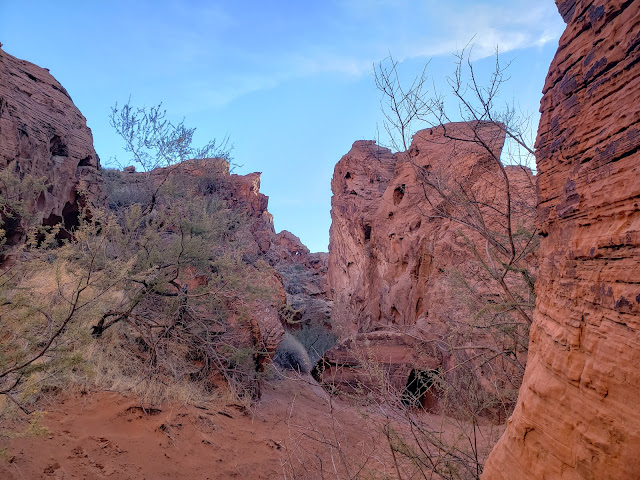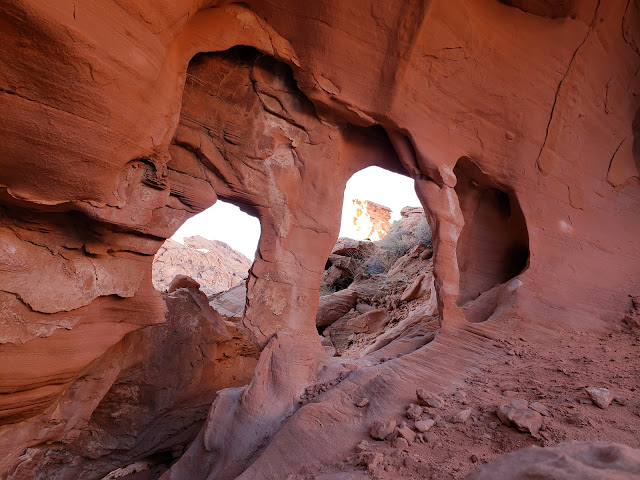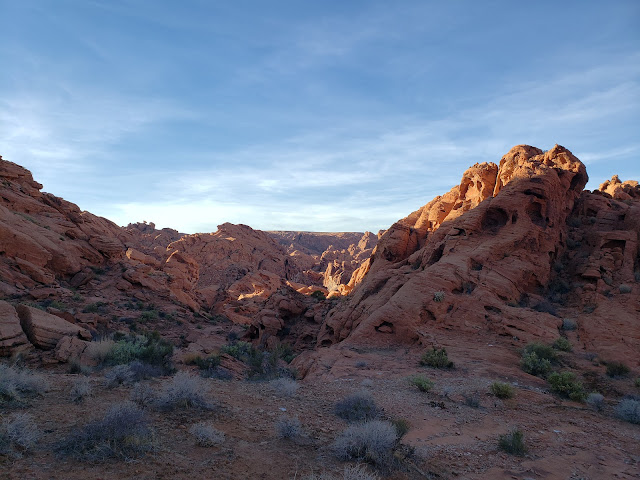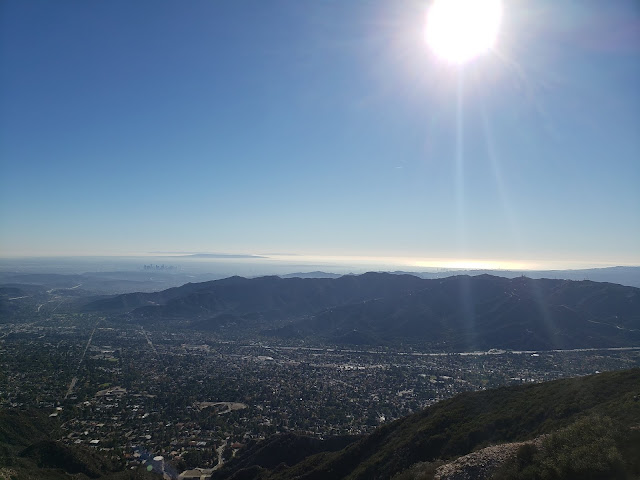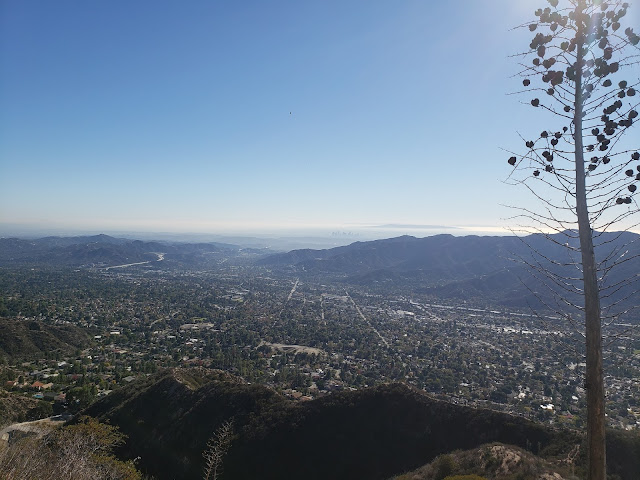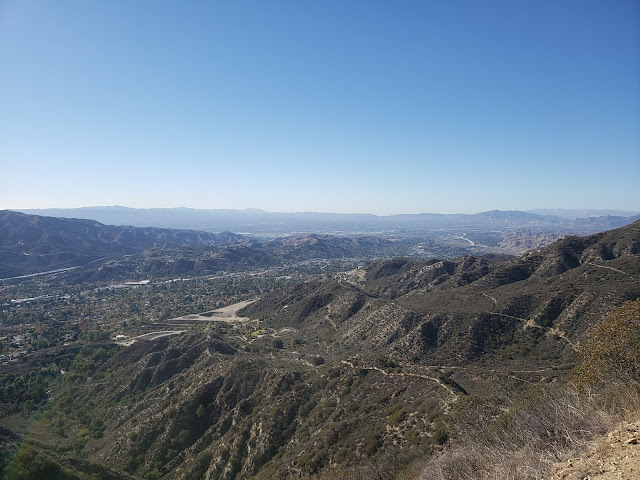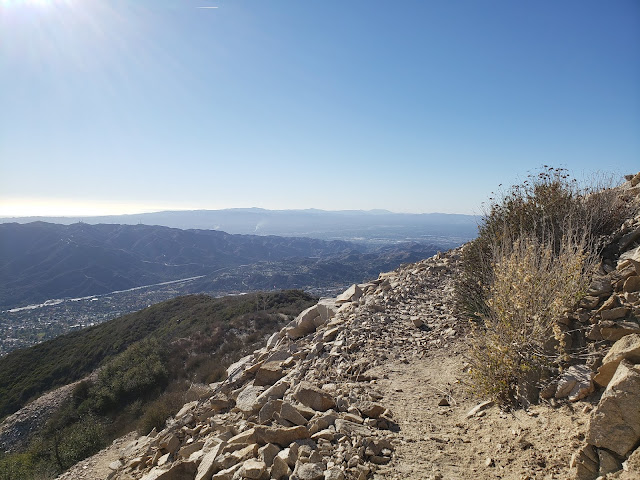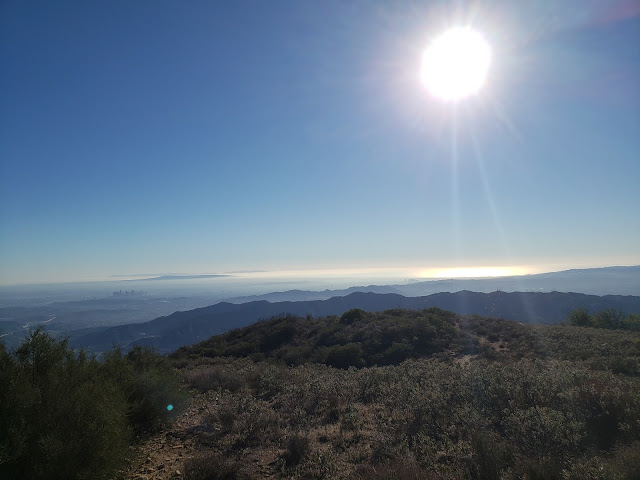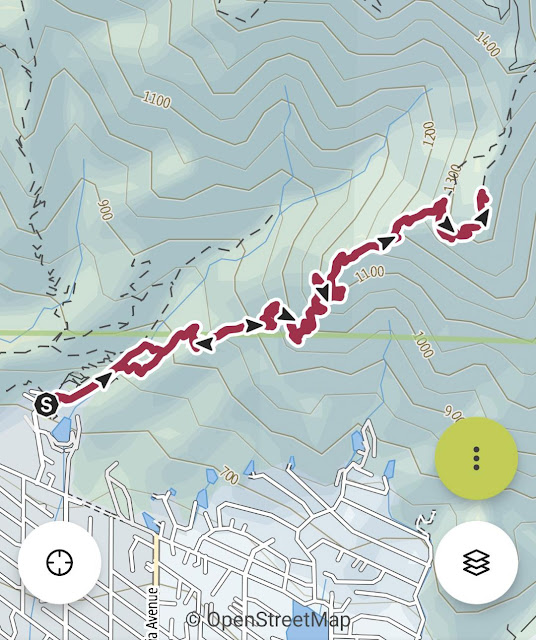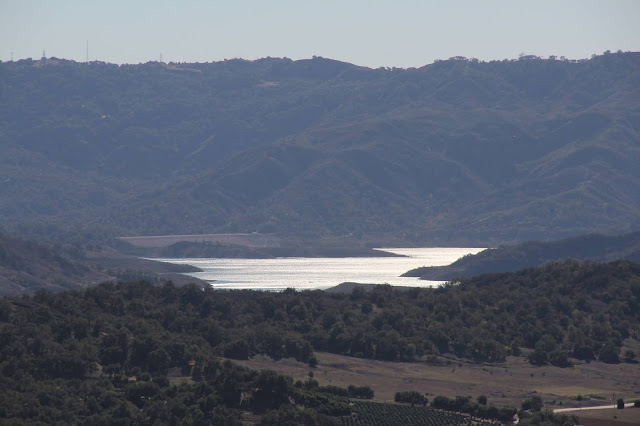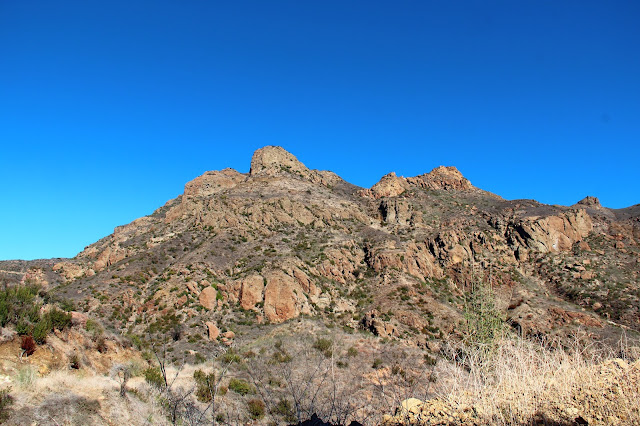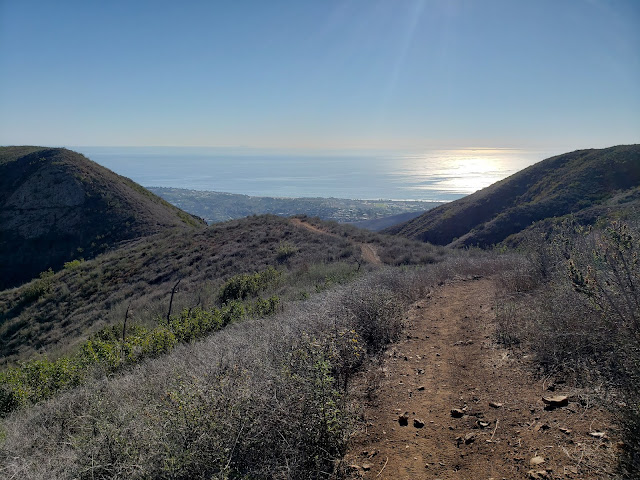In the first place, you can't see anything from a car; you've got to get out of the goddamned contraption and walk, better yet crawl, on hands and knees, over the sandstone and through the thornbush and cactus. When traces of blood begin to mark your trail, you'll begin to see something, maybe. ~Cactus Ed
As you drive north on I-15 out of Las Vegas, you pass through the Moapa Valley, a broad and arid expanse of high desert populated by screwbean mesquite and creosote. From the windshield of a speeding automobile, it presents as a hot, desolate and rather uninviting place. Which of course is why the United States government forcefully relocated the Moapa Bank of Paiutes here in 1869. At first blush, it was the shittiest and least useful land we could find to "give" to them as a reservation. But the U.S. government has a history of taking back what it gives to the natives. So although the land originally assigned to the Paiutes consisted of the entire Moapa River watershed (including lands along the Colorado River), in 1875 that allotment was reduced to a paltry 1,000 acres. Today, the reservation stands at approximately 75,000 acres in total, but given the government's abysmal record on taking back from the natives what they have given, it is more than ironic that the offensive appellation "Indian-giver" somehow inexplicably became associated with the supposed dishonesty and treachery of natives as opposed to the white man.
I've driven this stretch of road innumerable times on my way to Utah. I've seen the sign for the colorfully-named Valley of Fire which conjures up images of an inhospitable Dantean hellscape, but I had never once exited the freeway to take journey to the Inferno. Embarrassingly, the closest I ever came was when I exited the freeway once to patronize the Moapa Paiute Travel Plaza for fire water and explosives.
But on a recent trip across the desert, I had the luxury of a few extra hours, so I decided to see what I was missing. At the appropriate exit, I got off the freeway and started south-east across the desert following the winding 2-lane ribbon of asphalt approximately 15 miles to the park entrance. There, I tried without success to convince the attendant that I was a Nevada resident and thus entitled to a discounted entry fee, but he was shrewd and wasn't having any of it. So I coughed up the obligatory $15 charge and proceeded into the park.
Knowing that my time was limited, I had done a bit of research in advance and had targeted the Petroglyph Canyon Trail leading to the Mouse Tank. Although it's quite a short trail, on its face it appeared to provide maximum bang for both the dollar and hour. Beyond that, looking at Google Earth I discerned that it might be possible to continue down Fire Canyon Wash at the terminus of the trail proper for additional off-trail scampering and exploration. So that was my aim.
There was a fair number of cars at the trailhead as I started off down upper Fire Canyon Wash and into the maze of redrock fins, spires, pinnacles, hoodoos, hobgoblins, and other fanciful formations. But the path itself fortunately wasn't as crowded as I thought it might be, so I strode along in reverent awe of both the landscape and the various petroglyphs scratched into the black patina on the adjacent sandstone walls by the ancient Basket maker and Anasazi people who inhabited this place some 2000 years prior.
A short distance later, the trail abruptly terminated at the Mouse Tank (or more accurately, at a precipice looking down onto the Mouse Tank). "Mouse" (or more appropriately, "Little Mouse") was apparently the name of a renegade Southern Paiute who used the Valley of Fire as a hideout in the late 1800s. The "Tank" is a natural basin where precious water collects after the rains. Thus, the Mouse Tank.
Not willing to end my exploration so early, I scampered up a rocky bypass to the left and then dropped down into the Mouse Tank. I then continued down canyon following the sandy stream bed further into the bowels of fantastic Fire Canyon Wash. Initially, the wash was broad and the going easy. But as I penetrated further into the canyon, the path narrowed, the walls closed in, and the going got considerably more interesting. Here I found myself scampering around, crawling over, straddling, and ducking under large sandstone blocks that clogged the drainage and impeded the path forward. It was both fun and challenging and I was enjoying the serenity of the gorge which I had to myself. Ultimately, however, I reached a blockade that choked off further access to the drainage without a bit of down-climbing. It was potentially a point of no return. Being solo, and uncertain whether I could climb back out if I committed, I reluctantly decided to become a SAR statistic another day and retraced my steps back up canyon.
On my initial descent, I noticed another drainage entering from the right as I came down canyon. I still had time and daylight, so on my way out, I decided to explore this drainage as well. This ended up being less of a gorge and more of a shallow valley with a dry creek bed running up its center. I followed a faint use or game trail for awhile until I topped out at a flat saddle. To the east, there was an endless jumble of more sandstone. To the north and south the same. An endless playground for rock-hopping and off-trail scrambling. This was no country for old men.
Coming back down the valley I could see in the distance exactly where I needed to end up, but navigation in the redrock desert is tricky because everything looks the same. So ultimately I found myself in a slot of sorts that I knew was unfamiliar. Obviously on the descent, I'd failed to pay close enough attention to what I was doing and had veered off track. This is both the thrill and peril of desert hiking. It's very easy to get disoriented and lose your way. And when the temperatures are scorching, such an error can easily prove fatal.
Recognizing what I'd done, I doubled-back to the point where I zigged when I should have zagged, and then returned to the Mouse Tank wiser but without incident.
Back on the established trail, I noticed another side drainage with a sort of use trail entering again from the right (or the left if you are returning to the trailhead). Figuring I might as well leverage my limited time in the park as much as possible, I tacked hard left. Initially, the drainage was a flat and sandy walk. But a short distance in, I hit a crag where the path continued up a crack that split the rocky monolith. The climb up wasn't terribly challenging although it did add nice variety to the outing. And when I topped out, I was rewarded with more outstanding looks at the surrounding area.
It was now late afternoon, the shadows were creeping across the landscape, and the air was getting noticeably cooler. Time to leave. But on my way out, the Valley of Fire gave me one last gift. Just outside the park entrance, the handful of cars in front of me all came to a sudden stop. For a moment, I thought perhaps there had been an accident of some sort. But then I saw what all the commotion was about. A solitary desert big horn sheep was foraging immediately roadside, unfazed by the crowd of gawking onlookers. As I pulled along side to snap a picture out the passenger-side window, the sheep glanced at my without any apparent interest and then continued crunching away on the local grasses.
Back at the I-15, I pulled into the Moapa Travel Plaza thinking I'd pick up a nice six-pack of craft beer before crossing into the land of Zion where the selection is limited and the prices are high on account of "sin" taxes. I have heard Mormons jokingly refer to this governmental levy of additional taxes on the "Gentiles" (anyone who is not a Mormon and therefore, in theory, doesn't drink) as "bleeding the Beast." Ha, ha. Yeah, totally hilarious. All those drinkers and smokers subsidizing the Utah educational system for the benefit of all the hyper-fecund Mormon couples. Bleeding the beast indeed.
Anyway, I was surprised and dismayed to find that the Travel Plaza had a pretty uninspiring selection of beer to choose from. Coors, Miller, Budweiser - mostly just shitty, mass-produced American lager in gigantic quantities. Pass. I drank that swill growing up as a young apostate in Utah and I wasn't going there again. So I continued up the road to Mesquite where I stopped at Lee's Discount Liquor instead for my weekend supply of adult malt and grain beverages.
Having got a sample of what the Valley of Fire has to offer, I'm now all hot to return on my next pass through Moapa for further exploration. Although it's a relatively small park, there's still quite a bit of territory left unexplored.





